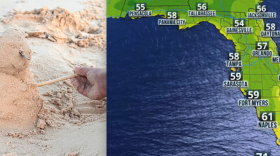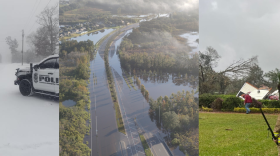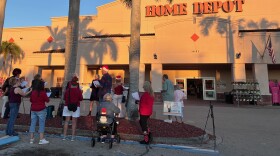One year ago, South Florida awoke to the destruction wrought by Hurricane Irma.
The storm had slammed into the Florida Keys as a Category 4 storm, bringing catastrophic winds and rain. According to the National Hurricane Center, the storm surge and tide produced flooding of 5 to 8 feet in the Lower Keys and winds reached 120-mph in Big Pine Key.
The storm left piles of torn down trees, couches, porta-potties, refrigerators, furniture and other debris across the islands.
Over the past year, South Florida has worked to rebuild. WLRN's Sundial producers traveled to the Keys to talk to Lynda Wells, Douglas Mader and Brian Vest, three Florida Keys residents with one mission: to help improve the lives of people in their community after the hurricane.
You can hear/read their stories below.

Lynda Wells , a 52-year-old licensed clinical social worker, says Hurricane Irma left not only physical damage — but also emotional. She has worked with a number of Keys residents suffering from post-storm depression and anxiety.
Several studies show that events like natural disasters can have lasting effects on a person’s mental health. Post-traumatic stress disorder (PTSD) is one of the most commonly studied psychiatric disorders that stem from natural disasters.
Officials noted an uptick in suicides in the months after Hurricane Irma. According to The Florida Department of Health, in 2017 there were 20 reported suicide deaths in Monroe County. This year, there have been 25.
Wells says the trauma, anxiety and depression that follows natural disasters can lead people to depression or even suicide.
“So many of the people I was working with were suffering from trauma...environmental trauma. Post-traumatic stress starts rising up when winds pick up and it rains,” said Wells, who has lived in the Florida Keys for 18 years.
Wells works to create a connection, trust and confidentiality with each of her patients. She meets people where they are comfortable: a grocery store, their homes or a hospital.
“When you’re looking at social work, you’re going to wear many, many different hats,” she said.
Wells is also a member of Key Strong, an organization helping families and communities in the Florida Keys that were affected by Hurricane Irma.
In August, Key Strong had a furniture giveaway and donated mattresses, sofas, and furniture to residents of Marathon.
Wells remembers returning to Marathon after Hurricane Irma. She spent the hurricane in Disney Springs, Orlando.
“The amount of debris that was there was overwhelming. It was taller than I was,” she said. "That's when it really hit me."
Wells says Key Strong's work has created a sense of safety. “Fixing a home is great,” she said. But “the next challenge is dealing with the mental health point.”

In April, Key Strong received a grant of $149,500 from the American Red Cross to work with people suffering from emotional distress caused by Hurricane Irma.
Wells has since dedicated many hours to serving the community and believes it is time to normalize the language around suicide, depression and anxiety. “This will help get people the assistance they need,” she said.
But there is no timeline to dealing with hurricane trauma. “For some people, it will be a life-long thing,” she said.
Wells recommends her patients “finding three to four routine things that they can rely on everyday” that will help them cope. An example: drink coffee every morning or take a long walk at least once a day.
Despite the challenges, Wells feels a sense of growth in her community. “I love where I’m working now because everybody in the community has been touched by this hurricane," she said. "When we work together as a team, it’s a sense of pride we have in the Keys.”
RESOURCES
If you or someone you know is having thoughts of suicide, can call the suicide hotline 24 hours a day at 800-273-8255.
Resources and support for preventing suicide can be found here.
In the Florida Keys, mental health services are provided by the Guidance Care Center. You can call 305-434-7660 or find more information here.

After Irma, the Marathon Veterinary Hospital was the only medical facility in operation in the Florida Keys. The regular hospital — or what Dr. Douglas Mader calls “the human hospital” — was completely destroyed.
“Storm was on Sunday and the following Friday the hospital was in full operation,” said Mader, 61, the owner of the vet hospital and a long time Keys resident.
So he offered his vet facility as an emergency operation center. In addition to treating injured animals, his team also responded to several people that were injured after the hurricane. “We were acting as first responders,” Mader said.
Post-hurricane, Mader’s veterinarian staff went from 37 to 26 employees. Retaining or hiring workers with no housing was a huge obstacle. Plus, the hurricane had demolished everything that made the island habitable. “As a business owner, it has been very difficult to run a business when you don’t have any help,” Mader said.
Monroe County's workforce has suffered since the hurricane. In July, it was 11 percent smaller than a year earlier, making it the biggest percentage drop in the workforce among Florida counties.
In addition to the veterinary hospital, Mader and his wife own six other properties. All properties were damaged, including his home. Almost 5,000 properties in the Florida Keys were severely impacted by Hurricane Irma.
The employees that did stay worked 50 to 60 hour weeks which, Mader said, “wears you out emotionally.”
Mader knew that keeping employees in the Keys was his priority. He created incentives to get people to come down for a job. He decided to dig deep and pay more for his workers.
He began to rebuild his six properties to rent out at discounted rates to employees and strived to create a familial environment at the vet hospital.
“Believe it or not I was able to get six houses gutted, rewired, redry-walled, countertops in and painted in seven weeks and get my employees back in there,” he said.
A year later, Mader has 32 employees, including three new hires since the hurricane.

Months after the hurricane, Brian Vest, 52, noticed Monroe County was struggling with clean up. So he decided to make a Facebook post to gather volunteers to help. The first project was a canal cleanup on Big Pine Key in December. Volunteers on kayaks picked up 76,000 pieces of trash out of the water by hand.
“After working eight hours on it, we didn’t even make a dent,” he said.
Vest realized it would be an ongoing project and in February created a Facebook group called, "The Conch Republic Marine Army." The group has met once a month since then and the volunteers have gone from a couple dozen to over 200 in a year.
“There isn’t a company you can call to come and do it,” said Vest, who formerly worked as a marine contractor, building marine equipment and boats.
Here’s how it works: Find trash in waterways. Pick it up. Pull to the shoreline. Collect trash in bags. And drop off trash piles at the Cudjoe Transfer station for Waste Management, where it gets sorted into vegetation, metals plastics and regular trash.
The storm continues to impact the Keys. Most of the debris has been removed from land but there is still much left underwater and in the mangroves. “Imagine all the stuff in your garage being dumped in a pool,” Vest said. “It is a difficult task.”
Vest has dedicated all of his time to the project. “The county needs to put me as a budget line item,” he said. “We’ve only really done a drop in bucket.”

Now Vest is working with university students to plant new mangroves in Big Pine Key, to replace the ones that have been killed off by floating debris and pollution.
To keep the project going Vest said the team needs grant money.
“I don’t think the federal government will do anything because there are natural disasters everywhere,” he said.
When asked how long he plans to lead the volunteer clean-up efforts Vest says he could do it for the rest of his life.
Below you can see the Sundial team's route to the Florida Keys.
Copyright 2020 WLRN 91.3 FM. To see more, visit WLRN 91.3 FM. 9(MDAyMTYyMTU5MDEyOTc4NzE4ODNmYWEwYQ004))









